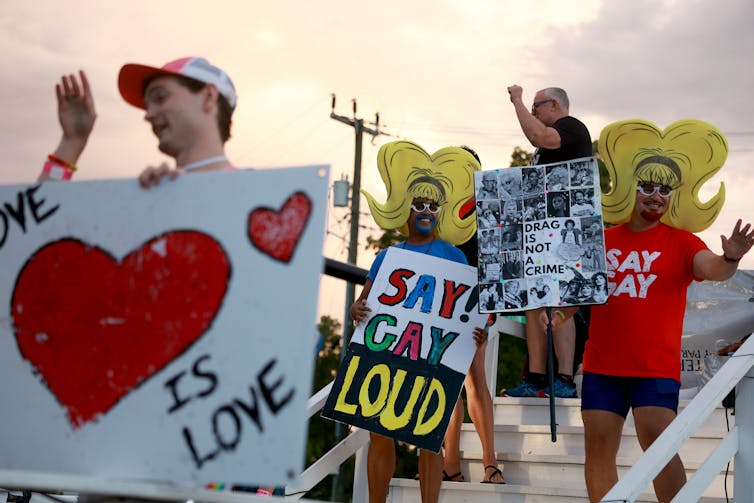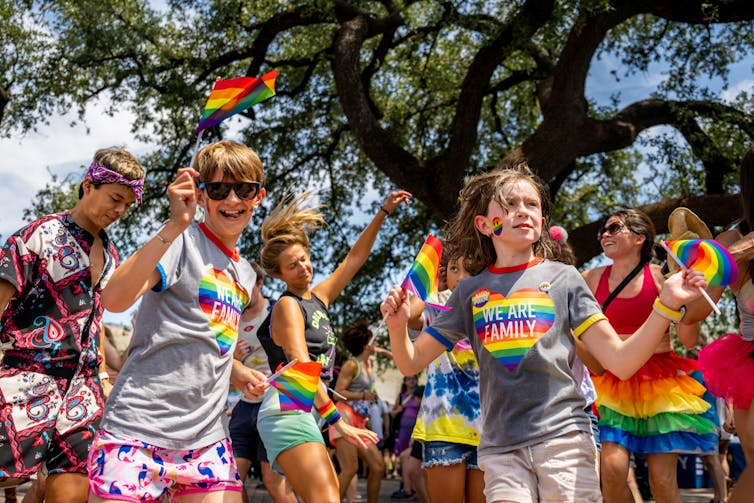[ad_1]
A number of cities and cities, largely within the American Midwest and South, are responding to a surge of proposed and permitted laws that restricts homosexual and transgender individuals’s rights by declaring they’re “sanctuaries” for individuals who determine as LGBTQIA+.
States like Alabama, Texas, Florida, North Dakota and Montana have handed 84 legal guidelines in 2023 alone that prohibit LGBTQIA+ rights, primarily focusing on transgender youngsters.
A few of these legal guidelines require lecturers to name trans college students by the title and pronoun they had been assigned at start, for instance, and prohibit any college students from discussing sexual orientation or gender id.
In September 2023, the small city of Lake Price Seaside, Florida, was the most recent to say that it was “a secure place, a sanctuary, a welcoming and supportive metropolis for LGBTQIA+ people and their households to stay in peace and luxury.”
A minimum of 15 states and cities have dubbed themselves LGBTQIA+ sanctuaries during the last a number of years.
Sanctuaries are typically thought of native refuges, the place people who find themselves afraid of persecution or discrimination have authorized immunity from explicit authorities insurance policies or legal guidelines.
As a scholar of constitutional regulation and a scholar of sanctuary actions, I feel that sanctuary declarations of every kind increase vital questions of constitutional regulation.
Probably the most tough is the query of whether or not and when these declarations violate the U.S. Structure by inserting state or native regulation above federal regulation.
The quick reply is that it will depend on what these declarations truly promise.

Joe Raedle/Getty Photos
Sanctuaries’ historical past within the US
Sanctuaries are a long-standing a part of the US’ constitutional historical past.
Within the Nineteen Eighties, for instance, Los Angeles, Chicago and Boston, amongst different locations, mentioned they’d not cooperate with federal immigration officers making an attempt to deport Central American migrants. These cities’ representatives mentioned the migrants had been eligible for asylum and had worry of returning to their homelands due to persecution – however federal judges nonetheless didn’t give them the fitting to remain within the U.S.
More moderen examples embody the proliferation of Second Modification sanctuaries in native cities and counties in 42 states, which say they won’t implement quite a lot of federal gun legal guidelines.
Now, Tallahassee, Florida, is among the many locations that’s contemplating declaring itself a LGBTQIA+ sanctuary. Different locations – together with Austin, Texas and Kansas Metropolis, Missouri – have additionally made themselves LGBTQIA+ sanctuaries over the previous couple of years.
Many of the sanctuaries give attention to the rights and safety of trans youngsters and their households, specifically.
In some locations, like Austin, the intention is to create a “secure place, a sanctuary, for transgender kids and their households.” In Kansas Metropolis, the intent is to make the town “a sanctuary for individuals searching for or offering gender-affirming care.”
Are they authorized?
Sanctuary declarations increase vital and tough questions of constitutional regulation, particularly once they declare immunity from federal legal guidelines or the U.S. Structure. That’s as a result of the Structure comprises Article 6, generally generally known as the supremacy clause, which says that the Structure and federal legal guidelines trump any state or native regulation.
The supremacy of the Structure to state and native legal guidelines is a key a part of how the U.S. authorities works. It implies that state and native governments should act inside the confines of the Structure, even when state or native lawmakers disagree with federal regulation.
So, does the Structure enable locations to say that they won’t observe discriminatory legal guidelines, reminiscent of those who stop trans college students or school from use of the restrooms that match their gender id?
The reply typically will depend on a sanctuary declaration’s exact wording and which means.
Some sanctuary declarations, just like the Lake Price Seaside decision, are merely rhetorical statements of help or opposition to a selected trigger or coverage. They’ve little or no authorized penalties.
Others, like some Second Modification resolutions, announce that native officers, typically sheriffs or different regulation enforcement personnel, won’t implement or adjust to legal guidelines limiting weapons that they regard as unconstitutional.
In these kinds of circumstances, the proclaimed sanctuaries straight problem what the Structure says, particularly that the Structure and federal legal guidelines are “the supreme Legislation of the Land”. State legal guidelines or legal guidelines handed by decrease ranges of presidency can not overrule them.

Brandon Bell/Getty Photos
Satan is within the particulars
You will need to be aware, nevertheless, that not all sanctuary declarations violate Article 6.
Relating to whether or not sanctuaries declared by states, cities or small cities are authorized, the satan is within the particulars – as with most issues in regards to the Structure.
A sanctuary decision that solely says that native officers disagree about what the Structure means or requires, with out pledging to interrupt federal regulation, is solely freedom of expression.
Consequently, a declare of sanctuary for LGBTQIA+ people who merely declares a metropolis or a city a secure and welcoming house, with out calling for the rest or any form of direct violation of federal regulation, is constitutionally protected. That is what the Lake Price Metropolis sanctuary declaration does.
A extra complicated case arises when sanctuary areas declare immunity not from federal regulation, however relatively from state or native legal guidelines that impede a sure group of individuals’s rights. These sorts of sanctuary declarations don’t ordinarily problem the authority of Article 6 or the Structure, typically, as a result of the sanctuary declare is made towards state legal guidelines, not federal regulation or the Structure.
Certainly, in lots of such cases, these sanctuaries search to guard individuals’s federal civil liberties and rights towards discriminatory state legal guidelines. That is what the Lake Price Seaside decision and different LGBTQIA+ resolutions do.
These sanctuaries truly reinforce the Structure’s authority by insisting upon the ability of individuals’s primary, constitutional ideas and rights over discriminatory state legal guidelines.
Sanctuaries that promise a secure house for individuals who determine as a part of the LGBTQIA+ group don’t undermine federal constitutional regulation.
As an alternative, they search to make good on the Structure’s commitments to equality and human dignity towards discriminatory insurance policies. In contrast to some sanctuary resolutions, most LGBTQIA+ sanctuaries don’t threaten the Structure – they rejoice it by insisting upon the supremacy of primary constitutional rights and ideas with out violating Article 6.
[ad_2]
Source link




